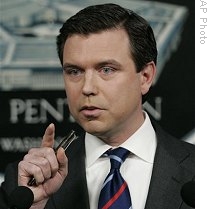Washington
18 October 2009
U.S. Defense Secretary Robert Gates heads to Japan and South Korea this week with North Korea's nuclear and missile programs and the new Japanese government's defense policies high on the agenda. The visits come just a couple of weeks before President Barack Obama will visit the two countries.
 |
| US Defense Secretary Robert Gates (File) |
"Obviously, I think both those issues will be subject for discussion as the secretary meets with the new Japanese Prime Minister, the foreign minister and his counterpart, the defense minister," he said.
The new Japanese ruling party, which took power after 50 years of rule by its political opponents, ran on a platform that promised a more assertive posture toward the United States. Comments by Pentagon officials indicate they hope the new Japanese leaders change their minds and continue the refueling mission, but the U.S. officials also recognize that Japan may decide to help in Afghanistan in other ways, perhaps by training police officers or donating money to development projects.
 |
| Pentagon press secretary Geoff Morrell speaks during a news conference, at the Pentagon in Washington (File) |
"I think it will also be an opportunity to reiterate our strong commitment to this alliance, and also to the agreements that have been reached between our two governments, not political parties, but between our two governments," added Morrell.
Another senior defense official, who spoke on condition of anonymity, said last week that any change in the complex series of agreements could unravel the entire plan, which was 15 years in the making. It involves moving thousands of U.S. forces stationed on Okinawa, building a new air base and re-locating some of the troops to Guam, among other aspects.
From Tokyo, Secretary Gates will travel to Seoul, where Geoff Morrell says he will try to further reassure officials of the U.S. commitment to South Korea's security, in the wake the latest short-range missile tests by North Korea earlier this month.
"Obviously missile launches of that nature are unhelpful and potentially destabilizing, and are frowned upon by us and others in the region," he said.
The United States is also in the process of re-locating tens of thousands of its troops in South Korea, and is working toward a transfer of wartime command responsibility to South Korean forces in 2012.
From Asia, Secretary Gates will travel to Slovakia for a meeting of NATO defense ministers expected to focus on Afghanistan. The alliance has primary responsibility for securing the country, but the United States has by far the largest number of troops there, and President Obama is in the midst of a major strategy review to determine whether to send even more troops, as the top NATO and U.S. commander wants.